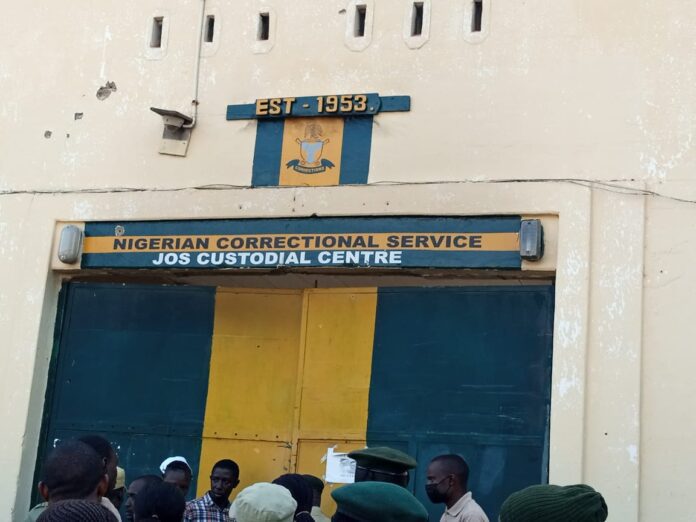National Issues
Nigeria’s Crumbling Prisons -By Ike Willie-Nwobu
Justice is necessarily the foundation on which any durable democracy must be built. However, for those who have to go to prison because justice dictates that they should, it does not have to be a death sentence in the literal sense of the phrase or the end to their dreams and humanity. The conditions in the prisons do not have to be such as to shock already weary prisoners into despair.

Nigeria may not be Gaza, that planet of persecution and its critically endangered people betrayed by a global conspiracy of silence and battered by the minute by Israeli airstrikes, yet, there is something distinctly carceral about Africa’s most populous country.
It is distinctive by its population, its considerable prison population and the unmistakably squalid conditions of its prisons which seem designed to ruin rather than rehabilitate.
To service one of its many myths that no one has any business being a criminal in Nigeria, Nigeria maintains carceral spaces within the country. Spaces it prefers to call correctional centers are crowded by either convicts or suspects awaiting trial.
In calling out and convicting its deviants, dissidents and those who are just different and defiant, Nigeria has distanced itself from ‘prison’ with its pejorative and punitive implications. It prefers “correctional center”,with its hint at reformation and rehabilitation. However, a name can only do so much. A wasp does not become a cricket simply because it was called so. In renaming prisons as correctional centers and taking a step towards transforming prisons to be places of reformation and rehabilitation, the authorities sought to nobly imitate other countries that have found more humane ways to treat their incarcerated and distance themselves from the designs of carceral states. As usual, the imitation has not gone beyond ideation. In the forest, the crying thing continues to cry.
A tour through Nigerian prison shows where the country is in its dream of being a decent and dignified society.
Dilapidated buildings, squalid conditions, overcrowding, non-existent hygiene, and everything else that can make one regret the day of their birth. When the nightmarish conditions of Nigerian prisons are factored into the fact that its extremely porous justice system ensures that many people go in for crimes they did not commit, the problem becomes a national emergency, a disaster waiting to happen. Disaster did happen on April 24 when the Suleja prison collapsed under a rush of riotous rainfall, setting about 118 prisoners suddenly free, churning out an answer to their prayers in the process.
In a country where many are content to be conditioned by God and mormon at once, who does the name-change serve? It must be the government. Suddenly, by the magical mechanics of a name-change ritualistically reflected in government gazettes, a government big on reforms is doing its bit and swatting aside misconceptions. For those looking out from prisons and those looking in from the outside, nothing has changed in the conditions of prisons and prisoners save for a name change- a correction that is anything but correctional, rather meant to castrate the fury of campaigners. Dignity does not condone half measures. Historically, anytime human dignity has been constrained to drops like bracken water from rusty old pipes, it has often died.
Justice is necessarily the foundation on which any durable democracy must be built. However, for those who have to go to prison because justice dictates that they should, it does not have to be a death sentence in the literal sense of the phrase or the end to their dreams and humanity. The conditions in the prisons do not have to be such as to shock already weary prisoners into despair.
One of man’s greatest attributes is the ability to surprise. The reason the human story is often brimming with warmth and wonder is that people have always shown that they can change. This has typically justified giving people a second chance, an opportunity to pick up the pieces, even if they hardly deserve the same. Prisons should be places where people are not only supported to reform and rehabilitate their lives but are encouraged to pick up the pieces, no matter how badly broken.
This means that the buildings and basics have to change. Like many other things in Nigeria, the prisons have suffered from the malaise of a poor maintenance culture. Many of the buildings are in poor and desperate conditions. Like the electricity infrastructure that crumble and call on darkness under the barest whiff of pressure from nature, many of the prisons are just waiting for the slightest pressure to crumble. Now that the rains are coming, the Nigerian authorities may want to look into the durability of the physical structures of the prisons.
Then, it also bears asking: what usually becomes of those who go to prison in Nigeria? Do they become better or worse behind bars?
Crime can be a bit cyclical in that once it works itself into a vicious cycle, as it so often does, it is almost impossible to curtail. Prisons where conditions are historically poor have been known to provide fertile breeding grounds for crime and the vices that become crime, ensuring that no one really changes for the better then.
The less said about a country that cannot even properly contain and change its criminals the better, but the danger posed by prisoners let loose by the elemental forces of nature should be enough to jolt a slumbering country awake.
Ike Willie-Nwobu,









